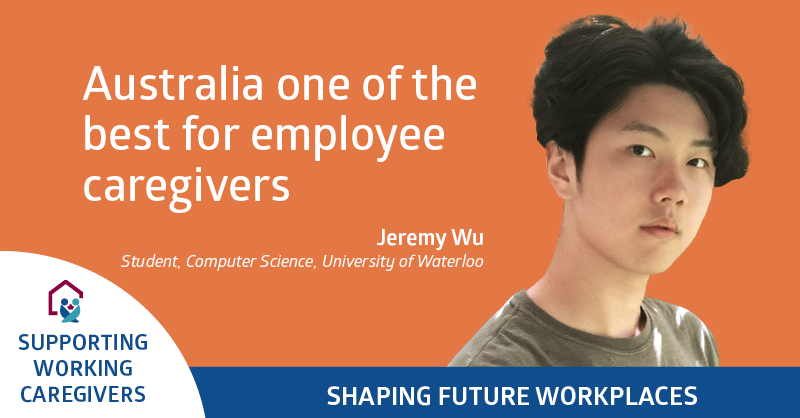Impacts of the COVID-19 on carer-employee well-being: a 12-country comparison
The opportunity to pull out Canadian employee caregiver data from a 12-country analysis and compare where we stand was too good to be missed.
Those who provide unpaid care to family or friends with a long-term health condition, a physical or mental disability, or problems related to aging while working in the paid labour force are referred to as employee caregivers or carer-employees (CEs) (Ireson et al., 2018). This paper assesses the impact of COVID on CEs and compares Canada globally, with respect to the harm done by the COVID-19 pandemic and the supports in place for CEs.
In 2020, the emergence of the COVID-19 pandemic and subsequent lockdowns disrupted hundreds of thousands of businesses and put a great degree of strain on healthcare systems globally. Many CEs, an already vulnerable population were, and continue to be, exposed to additional stresses as they face job insecurity and increased caregiving demands.
Drawing on the survey data from the 2020 Carer Well-being Index Report which included responses from over 9000 unpaid caregivers across 12 countries, a soon to be released paper reports on the similarities and differences in the stresses CEs faced during COVID-19. Stand-alone CE data from Canada is compared to the 11 other participating countries on responses relating to: time spent caring; sources of support; work impacts, and; emotional/mental, financial, and physical health.
In Canada, CEs on average spent more time caregiving during COVID than prior to the pandemic. Sixty-eight per cent reported that caregiving was more difficult, which is understood to be related to the reduction of formal and informal resources to support caregiving and general extracurricular activities and schooling. Thirty-four per cent reported more difficulty balancing their paid job and caring responsibilities. Seventy-one per cent of CEs felt their mental health has worsened.
Prior to COVID-19, most CEs in Canada had never received support, financial and/or non-financial, from government or their employers. The only countries where over half of all CEs reported having received support, both financial and non-financial, at some point from either the government or their employers were Australia, China, and India.

Percent of CEs receiving support before and during COVID-19: G7 and Australia (Table developed for pending paper)
During COVID-19, the percentage of CEs receiving support from governments and employers increased across all countries. Interestingly, Canada moved from 5th to last of the G7 countries and Australia for CEs receiving employer support during the pandemic.
Coupled with the findings suggesting that better employer support is linked to better CE mental health, these results serve as a call to action by the employer community to better support Canadian CEs.
The information and analysis in the upcoming paper is broader than this blog addresses, covering impacts on CE health, well-being, career, and effectiveness at work. Once published, a link to the paper will be posted.
References
Ireson R, Sethi B, Williams A. (2018) Availability of caregiver‐friendly workplace policies (CFWPs): an international scoping review. Health & social care in the community, 26(1):e1-e14. doi:10.1111/hsc.12347
ABOUT THE PROJECT
Carers Canada is leading the knowledge mobilization activities for a multi-sectorial research program to spread and scale a carer-friendly workplace standard, known as the ‘Carer-Inclusive and Accommodating Organizations’ Standard (CSAB701-17). Led by Dr. Allison Williams, CIHR Research Chair in Gender, Work and Health at McMaster University, the research program consists of six inter-related sub-projects that will: increase awareness of the standard across Canada; evaluate readiness to change; determine feasibility and cost benefit; embrace cultural competency; consider Indigenous perspectives; and create an international standard. Learn more

CIHR/SSHRC Healthy Productive Work Partnership Grant “Scaling up the Career Inclusive Accommodating Organizations Standard” FRN: HWP-146001 (CIHR); 890-2016-3018 (SSHRC).
 Jerry WuJanuary 24, 2022
Jerry WuJanuary 24, 2022

Impacts of the COVID-19 on carer-employee well-being: a 12-country comparison
The opportunity to pull out Canadian employee caregiver data from a 12-country analysis and compare where we stand was too good to be missed.
Drawing on the survey data from the 2020 Carer Well-being Index Report which included responses from over 9000 unpaid caregivers across 12 countries, a soon to be released paper reports on the similarities and differences in the stresses CEs faced during COVID-19. Stand-alone CE data from Canada is compared to the 11 other participating countries on responses relating to: time spent caring; sources of support; work impacts, and; emotional/mental, financial, and physical health.
In Canada, CEs on average spent more time caregiving during COVID than prior to the pandemic. Sixty-eight per cent reported that caregiving was more difficult, which is understood to be related to the reduction of formal and informal resources to support caregiving and general extracurricular activities and schooling. Thirty-four per cent reported more difficulty balancing their paid job and caring responsibilities. Seventy-one per cent of CEs felt their mental health has worsened.
Prior to COVID-19, most CEs in Canada had never received support, financial and/or non-financial, from government or their employers. The only countries where over half of all CEs reported having received support, both financial and non-financial, at some point from either the government or their employers were Australia, China, and India.
During COVID-19, the percentage of CEs receiving support from governments and employers increased across all countries. Interestingly, Canada moved from 5th to last of the G7 countries and Australia for CEs receiving employer support during the pandemic.
Coupled with the findings suggesting that better employer support is linked to better CE mental health, these results serve as a call to action by the employer community to better support Canadian CEs.
The information and analysis in the upcoming paper is broader than this blog addresses, covering impacts on CE health, well-being, career, and effectiveness at work. Once published, a link to the paper will be posted.

Percent of CEs receiving support before and during COVID-19: G7 and Australia (Table developed for pending paper)
References
Ireson R, Sethi B, Williams A. (2018) Availability of caregiver‐friendly workplace policies (CFWPs): an international scoping review. Health & social care in the community, 26(1):e1-e14. doi:10.1111/hsc.12347
Jerry Wu is an undergraduate student studying computer science at the University of Waterloo. During his first co-op term, he worked as a Data Analyst at the McMaster School of Geography and Earth Sciences, specializing in research related to the health and wellbeing of carer employees. As a data analyst, Jerry used statistical software such as STATA to analyze large cross-sectional data sets like the GSS, using regression models to find the relationship between caring, health, and work. Jerry has authored two papers on the subject which will be published in the near future.
FAVORITE PASTIME: I have studied classical voice since I was 9, so in my free time, I like to practice singing. I actually came second in a provincial music festival in grade 11! I love singing German lieder, and my favourite composers are Wolf and Schumann
Facebook: @very.jerry.wu
Instagram: @veryjerrywu
ABOUT THE PROJECT
Carers Canada is leading the knowledge mobilization activities for a multi-sectorial research program to spread and scale a carer-friendly workplace standard, known as the ‘Carer-Inclusive and Accommodating Organizations’ Standard (CSAB701-17). Led by Dr. Allison Williams, CIHR Research Chair in Gender, Work and Health at McMaster University, the research program consists of six inter-related sub-projects that will: increase awareness of the standard across Canada; evaluate readiness to change; determine feasibility and cost benefit; embrace cultural competency; consider Indigenous perspectives; and create an international standard. Learn more

CIHR/SSHRC Healthy Productive Work Partnership Grant “Scaling up the Career Inclusive Accommodating Organizations Standard” FRN: HWP-146001 (CIHR); 890-2016-3018 (SSHRC).
